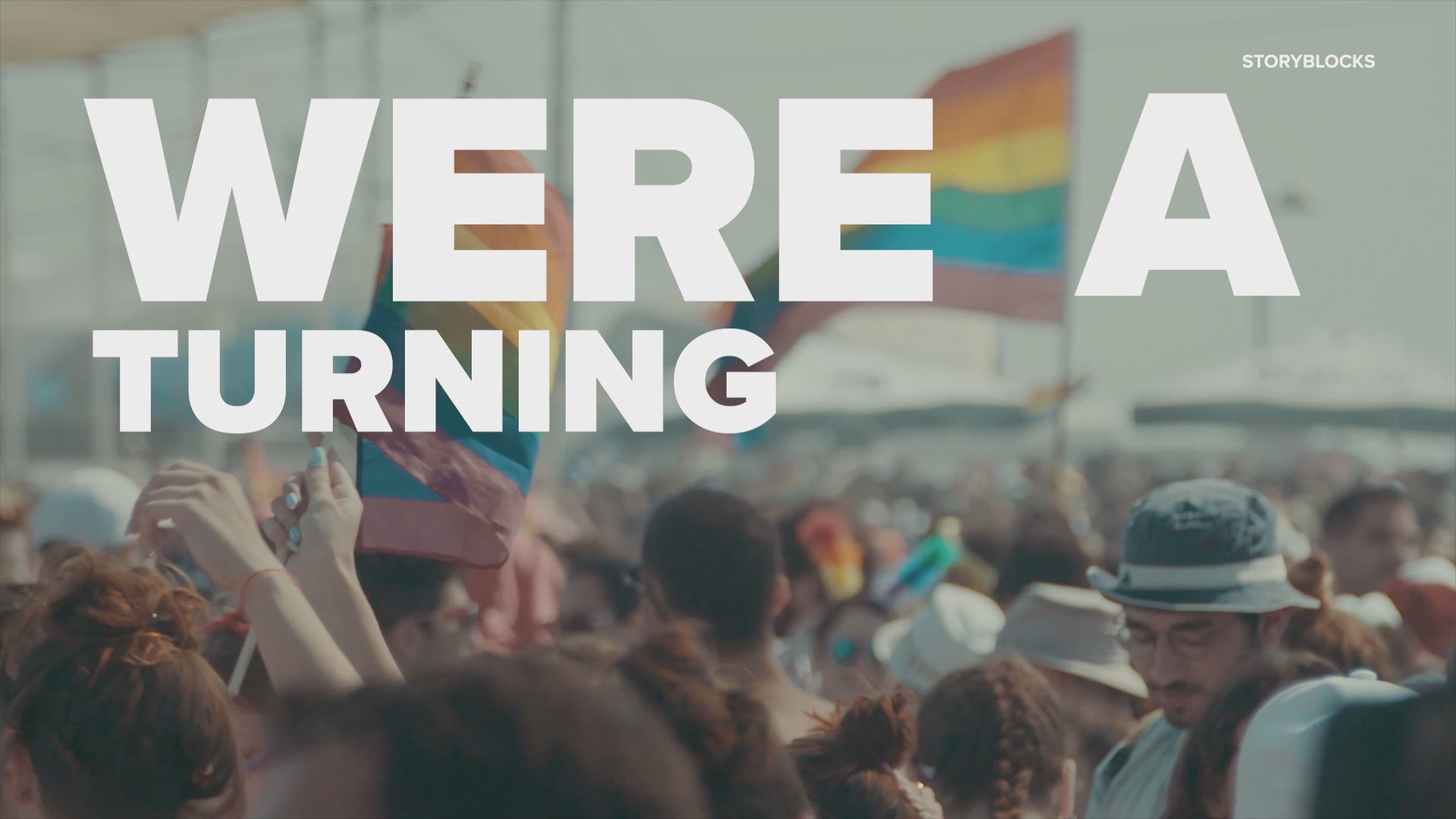ST. PETERSBURG, Fla. — The anniversary of the 1969 Stonewall Uprising, the movement that sparked Pride, is this weekend.
It comes as the fight for equality is amplified by Black Lives Matter protests across the United States, with the coronavirus pandemic, which disproportionately affects the African American community, serving as a backdrop. All of this combined has thrust the LGBTQ+ and Black communities into the forefront.
That's why, this Pride Month, we wanted to highlight some of the most pivotal Black, LGBTQ+ Americans to date.
From former NFL players, to drag queens, to politicians, you'd be hard-pressed not to find their fingerprints all over the fabric of modern-day society.
While many more names could have certainly made this list, here are just a handful who have moved the needle forward on equality:
The Firsts:
Alphonso David
In its nearly 40-year history, the Human Rights Campaign had never had a person of color serve as president.
That is, until Alphonso David came along.

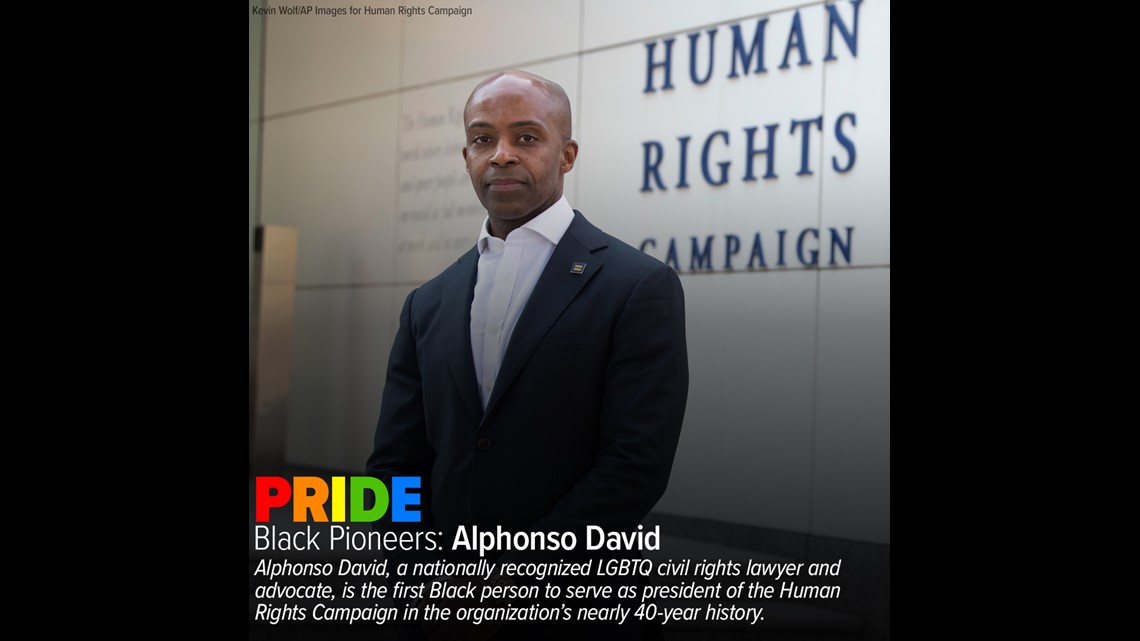
The Human Rights Campaign says it represents a force of more than three million members and supporters nationwide and is the largest national LGBTQ civil rights organization in the country. David is now its leader.
However, he had a long, complicated road to where he is now.
According to WUSA, David grew up in Liberia where his uncle was president. However, his uncle was assassinated, leading his family to move to the United States. There, his father said he would disown any child of his who identified as gay.
Unfortunately, David's father followed through on his word.
Fast forward to the present day, and David seems to be thriving.
The Human Rights Campaign describes him as “an accomplished and nationally recognized LGBTQ civil rights lawyer and advocate” who has “significant litigation and management experience in the public, private and not-for-profit sectors."
His work includes serving in New York Governor Andrew Cuomo's cabinet, as well as fighting for the LGBTQ+ community and those living with HIV and AIDS in the courtroom.
Andrea Jenkins
As the calendar turns to June each year, Pride parades are typically preparing to take over downtown streets across the country -- but not in 2020.
The same streets where colorful parades and chants about love were supposed to take place were instead marched by protesters angry and seeking change in the wake of George Floyd’s death while in Minneapolis police custody.
Anger that police brutality still exists in America.
Anger that the Black community lost another to a preventable death.
Anger that systemic racism continues to hold tight in almost every facet of society.
So, perhaps there was no better woman for the moment than Andrea Jenkins.

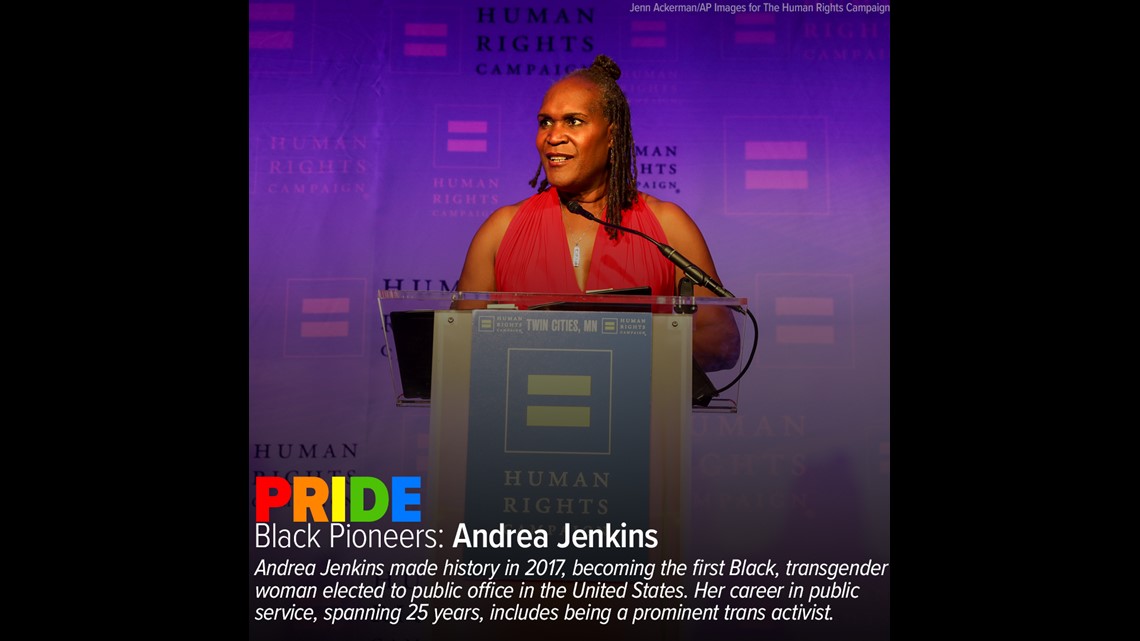
Jenkins is the first Black, openly transgender woman to be elected to public office in the United States and serves in South Minneapolis, where Floyd died.
“That’s where I live, at the intersection of LGBT politics and racial injustice,” she told the New York Times earlier this month.
As the country grappled with its civil unrest amid Pride Month, the spotlight found Jenkins. Again, perhaps there was no better woman for the moment, and she didn’t disappoint.
Jenkins sang “Amazing Grace” at a press conference following Floyd’s death with Pride Month just days away. She spoke passionately to Minneapolis and beyond about African American struggles. Perhaps, there was no better woman for the moment.
Her bio says she’s spent 25 years in public service. During that time span, she’s worked on a community-building project called "One Minneapolis, One Read" to address racial healing. She also worked on the Trans Equity Summit to promote awareness and inclusion.
E. Denise Simmons
In 2008, E. Denise Simmons made history as she became the first Black, openly lesbian mayor in the United States.

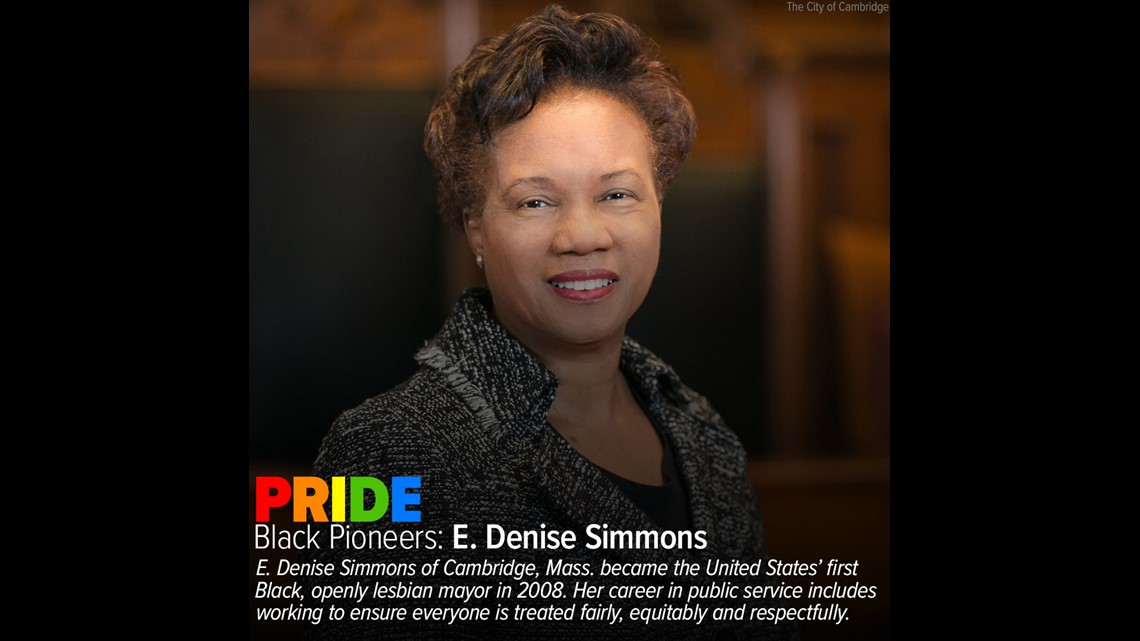
Along with that distinction, she also became the state of Massachusetts’s first Black, female mayor.
She held that title in the city of Cambridge, where she continues to serve today on the city council.
Long before she made history, though, she was working to better her community.
According to the city of Cambridge, she served as the Director of the Cambridge Civic Unity Committee in the 80s, as a member of the Cambridge School Committee in the 90s and has been on the Cambridge City Council since 2002.
Her life’s work includes advocating for all people to be treated fairly, equitably and respectfully. She’s credited with holding periodic town halls, one for the LGBTQ+ community and another for senior citizens.
She also has a history of supporting better job protections and wage fairness for the city’s cleaning crews. Since the start of the COVID-19 pandemic, there’s been a heightened awareness and appreciation for the role custodians and janitors play in society.
There’s another common thread connecting her past experiences to the issues of today. Simmons told the Wall Street Journal in 2019 that her greatest accomplishment came 10 years prior, in 2009, at the tail end of her first term as mayor. It came after the arrest of a Black Harvard professor by a white officer, she explained.
“I was able to keep the city calm and have a citywide conversation around race and anti-bias,” she said at the time.
She has lived in Cambridge her whole life, serving the city for three decades. She told the Wall Street Journal that her greatest challenge was holding the title of the city’s first Black, openly lesbian mayor while remaining focused on the city she served.
“I was elected to serve here, and Cambridge was and is my focal point,” she said.
Ron Oden
So, E. Denise Simmons holds the prestigious title of the nation’s first Black, lesbian mayor, but who was the country’s first Black, gay mayor?
That distinction belongs to former Mayor of Palm Springs, Calif. Ron Oden. He was elected mayor in 2003.

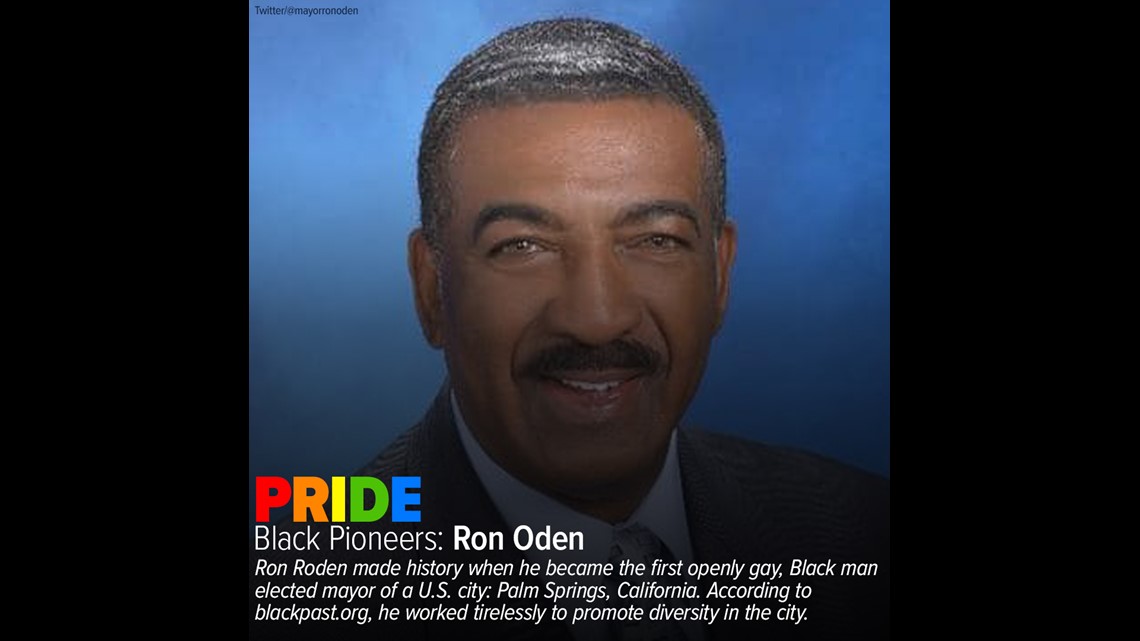
He told The Advocate, an LGBTQ magazine, in 2004 that after his election, he gained international attention.
“The mayor of Paris contacted me, as did other mayors from around the world,” he said.
He also had some powerful words for the young, gay, Black Americans at that time.
“We are a part of this country by blood, by effort and by history. And we have the responsibility and the privilege to participate in every level of government.”
He practices what he preaches.
Before his mayoral term, he served on the Palm Springs City Council for five years, advocating for social causes, according to blackpast.org. Through his work in public service, he worked tirelessly to promote equality.
His life’s work has not gone unnoticed.
Just last year, Oden received a lifetime achievement award from Palm Springs Greater Pride.
The award is presented each year to individuals who bring awareness to and further the causes of lesbian, gay, bisexual and transgender communities, according to the Desert Sun.
The Fighters:
Bayard Rustin
In Dr. Martin Luther King, Jr.’s “I Have a Dream” speech, he opened with this: “I am happy to join with you today in what will go down in history as the greatest demonstration for freedom in the history of our nation.”
The “greatest demonstration for freedom in this history of our nation” was the 1963 March on Washington and it was organized by Bayard Rustin, a Black, gay man.

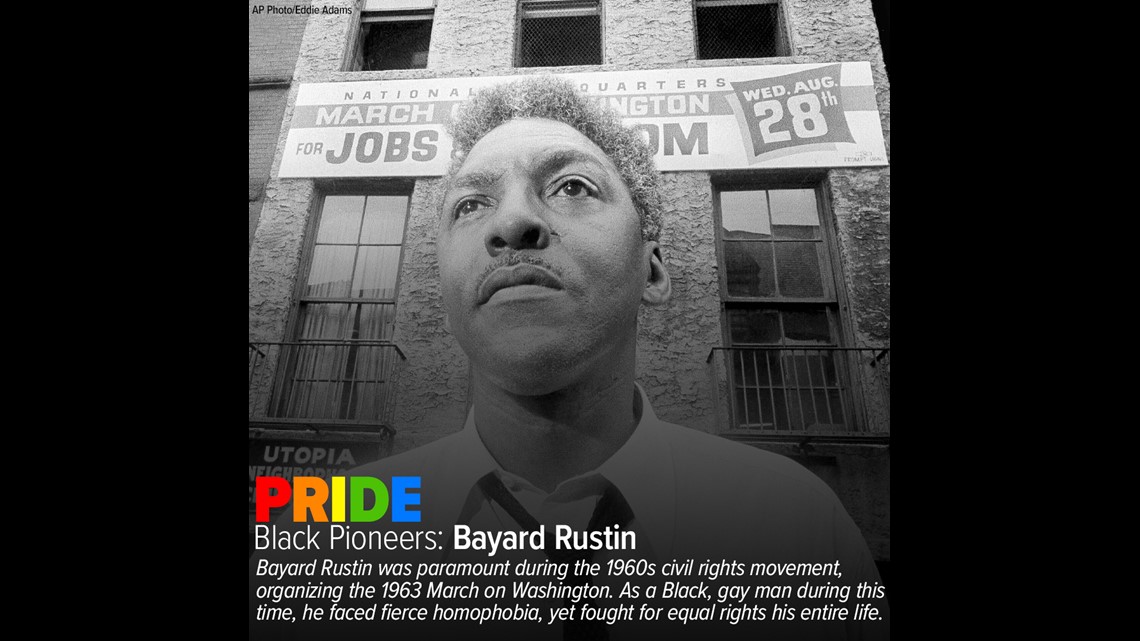
According to government archives, Rustin was only given two months to plan what would be a mass protest with more than 250,000 peaceful demonstrators.
Peace was Rustin’s game, according to rustin.org, despite being silenced, threatened, arrested and beaten because of his minority status. In the documentary film, Brother Outsider: The Life of Bayard Rustin, he is quoted as saying, “I want no human being to die.”
In fact, multiple reports point to Rustin as helping Dr. King adopt Mahatma Gandhi’s peaceful philosophy.
As Rustin’s life went on, he started speaking up more about gay rights.
PBS reports that in the 1980s, Rustin said, “I think the gay community has a moral obligation…to do whatever is possible to encourage more and more gays to come out of the closet.” He also is credited for bringing the AIDS epidemic to the attention of the NAACP.
In 2013, President Barack Obama posthumously awarded Rustin the Medal of Freedom. Below is what the Obama White House’s Archives say of him:
"Bayard Rustin was an unyielding activist for civil rights, dignity, and equality for all. An advisor to the Reverend Dr. Martin Luther King, Jr., he promoted nonviolent resistance, participated in one of the first Freedom Rides, organized the 1963 March on Washington for Jobs and Freedom, and fought tirelessly for marginalized communities at home and abroad. As an openly gay African American, Mr. Rustin stood at the intersection of several of the fights for equal rights."
Kylar Broadus
Kylar Broadus, a Black, trans man, is an attorney, activist, public speaker, author and professor.

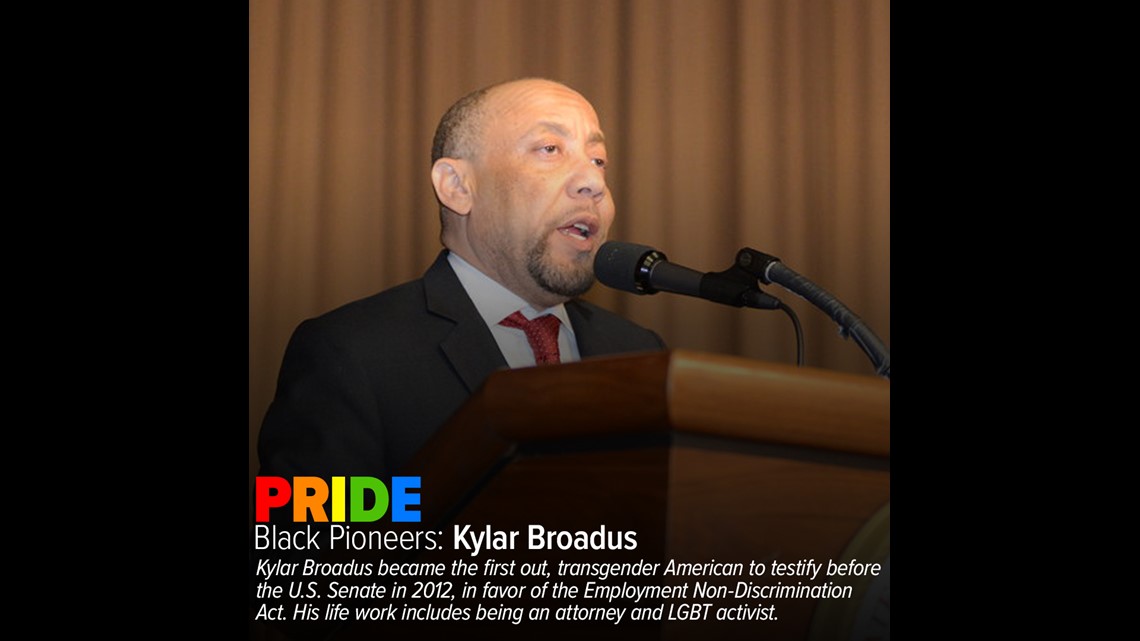
All of those titles culminate into a life dedicated to the LGBTQ and trans movements.
A Missouri native, Broadus began practicing law in Columbia in 1997. His clients included those in the LGBT community. He currently sits on the board of Freedom for All Americans.
However, between then and now, his contributions in the fight for equality have been monumental.
According to the LGBT Bar, He served as Senior Policy Counsel at the National LGBTQ Task Force, Operations Manager at the Transgender Legal Defense and Education Fund, and Director of the Transgender Civil Rights Project.
As if that work wasn’t enough, in 2012, he made history.
Broadus was the first openly transgender person to testify before the U.S. Senate when he spoke in support of the Employment Non-Discrimination Act.
As a result of his life’s work, the LGBT Bar Association of Los Angeles awarded him with the Trans Trailblazer Award.
And the accolades don’t stop there.
According to his bio, he’s also received the 2018 Gentlemen of Excellence Award by the Gentlemen’s Foundation of Atlanta, a Certificate of Legal Excellence by the City of New York, County of Kings, District Attorney’s Office, and the Sue J. Hyde Activism Award for Longevity in the Movement at the National Conference on LGBT Equality to name a few.
However, the highs certainly have come with their share of lows for Broadus.
According to the Black Enterprise, Broadus always knew he was in the wrong body. It took a 15-year transition, and at one point, cost him a job.
However, he has since lived a life full of service to his community and has fought diligently for equal rights.
Marsha P. Johnson
Marsha P. Johnson is a central figure in the Black, LGBTQ+ community’s fight for justice.

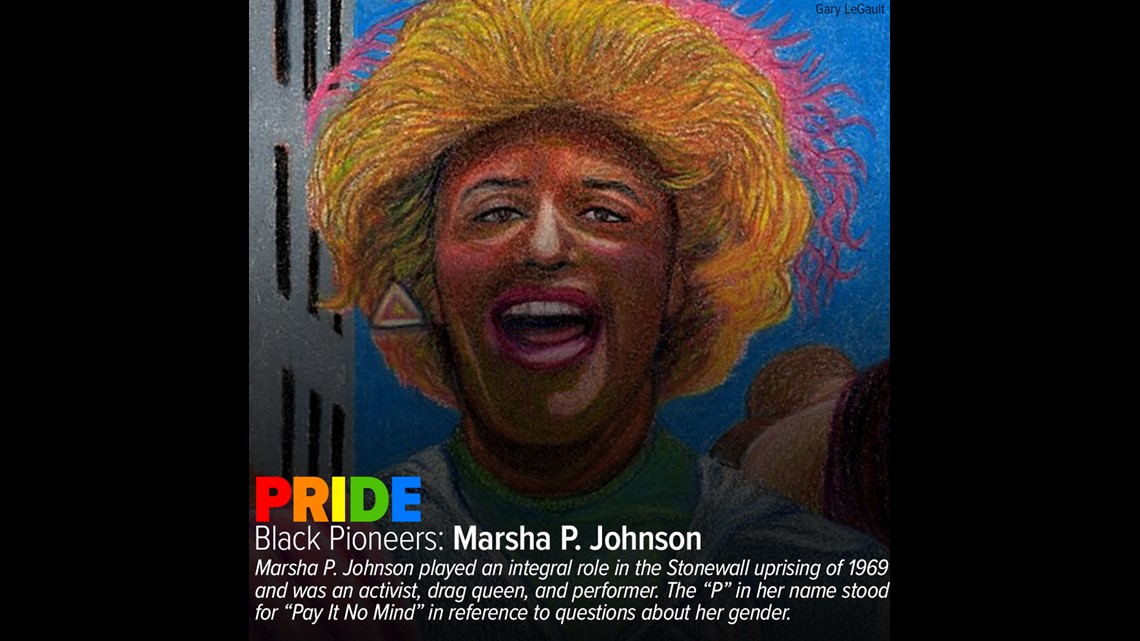
She was at the forefront of New York City’s gay liberation movement for decades and reportedly played a significant role during the 1969 Stonewall Uprising, which led to why we celebrate Pride in June today.
She, along with Sylvia Rivera, another LGBTQ activist, are credited with helping to build the modern-day LGBTQ movement.
Johnson was a self-described drag queen, performer and survivor who often faced discrimination. WUWM reports that many people believed she was a victim of what she often fought against: “violence and abuse of the queer community faced by the police.”
The New York Times says that since her death in 1992, her legacy has soared.
“She has been praised for her insistent calls for social and economic justice; for working on behalf of homeless street youth ostracized by their families for being gay or otherwise not conforming to traditional ideas about gender; and, later, for her advocacy on behalf of AIDS patients. Some have called her a saint.”
According to Tatler Magazine, Johnson was born in 1945 in New Jersey. Once she turned 17, she moved to New York City and began exploring her “feminine identity and her sexuality.”
She was often easily recognized by what she wore, and became a prominent figure in the Greenwich Village, where the Stonewall Inn stands.
She also helped found a number of organizations to support the youth in the LGBTQ+ community, according to CNN, including a group that offered housing to homeless and transgender youth, the first LGBT youth shelter in North America, and the first organization in the United States led by trans women of color.
Sadly, Johnson died in what many believe was a suspicious death in 1992, according to WUSM.
Her body was found in the Hudson River, and at the time, was ruled a suicide. Many have cast doubt, however, and the Netflix documentary “The Death and Life of Marsha P. Johnson,” examines those suspicions.
Although her life ended too soon, her legacy will live on forever, and as we celebrate this Pride Month, we must not ever forget Marsha P. Johnson’s contributions to the movement.
The "Marsha P. Johnson Institute" has since been created in her name, aimed at defending the human rights of Black, transgender people. To learn more, click here.
The Stars:
Laverne Cox
Perhaps you know Laverne Cox from the Netflix hit, "Orange Is the New Black,” but she’s much more than an actress in an orange jumpsuit, although the role did put her in the history books.

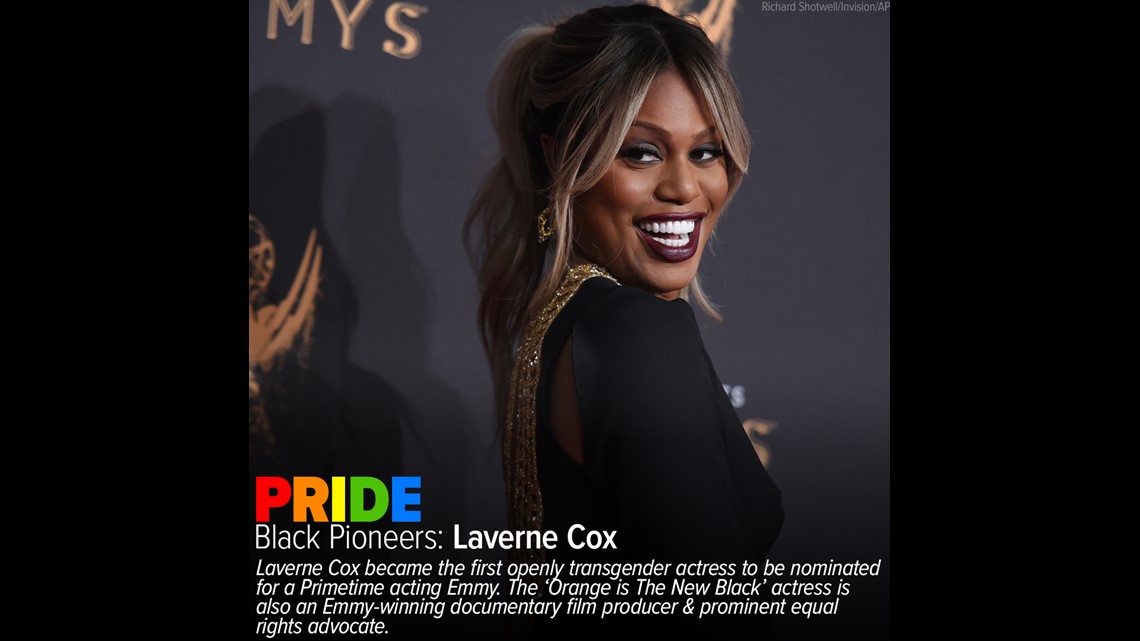
She’s also an Emmy-award winning documentary producer and an equal rights advocate.
As her latest documentary, “Disclosure,” streams on Netflix, her role as one of the leading voices in the Black, trans community blossoms.
“Disclosure,” which analyzes Hollywood’s impact on the trans community, is her latest work to move the movement forward. Her 2014 documentary, “The T Word,” which follows the lives of seven transgender youths, picked up a Daytime Emmy. The win landed her the distinction of becoming the first openly trans woman to win the award.
2014 was a pivotal year for Cox. She also appeared on the cover of Time magazine, titled “The Transgender Tipping Point,” which, according to The Oprah Magazine, helped bring the trans rights movement to the forefront. It was the first time a transgender person was featured on Time’s cover.
However, her history-making doesn’t stop there.
She was also the first trans woman to appear on the cover of Cosmopolitan and the first to be nominated for a Primetime acting Emmy.
She continues to help the trans community make strides by being an active social media user and remaining visible to those who may need representation.
Originally from Mobile, Alabama, she told Time she was bullied, adding that she started to “push down” her feelings of being transgender at a young age, and at one point even attempted death by suicide.
However, as her life went on, she wrote in her bio that the ABC drama, “Dirty Sexy Money,” changed her life. The show featured the first openly transgender actress to have a recurring role on a prime time show, Candis Cayne.
Wanting to be a performer her whole life, it was Cox’s exposure to Cayne let her know it was possible.
She would go on to become an accomplished star in her own right, giving her a platform to big enough to push a movement forward.
RuPaul
RuPaul, a lifetime performer, is as accomplished as they come.

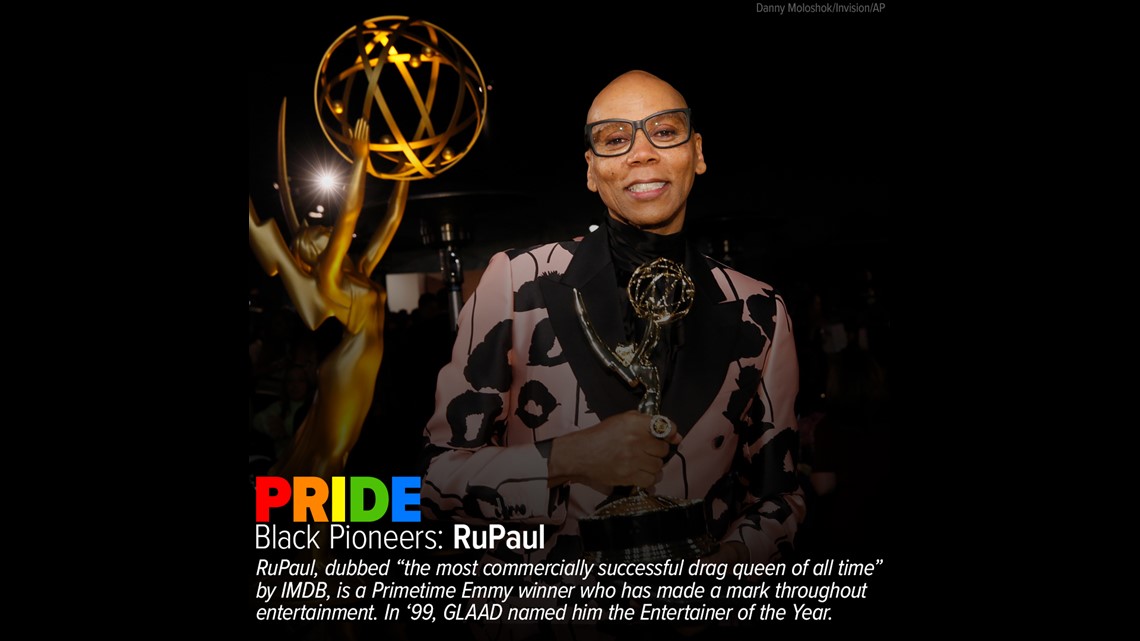
In fact, IMDB even dubs him as “the most commercially successful drag queen of all time.”
A San Diego native, RuPaul moved to Atlanta as a teenager before settling in New York City where his fame was born.
In 1993, his debut album, “Supermodel of the World,” would launch the success of his single, “Supermodel (You Better Work).” He later performed that song during a gay rights rally in Washington D.C., according to IMDB. He went on to create 14 total solo albums.
RuPaul is no one-trick pony, though.
He has more than 70 acting credits as well as being the producer of the Emmy-award winning “RuPaul’s Drag Race.” He’s also won a Critics Choice Award, an MTV Movie, and TV Award, and was named one of Time Magazine’s 100 Most Influential People of 2017.
However, it’s not all glamour for RuPaul.
He also served as a spokesperson for M.A.C. Cosmetics, helping to raise more than $22 million to fund AIDS research with that platform.
To learn more about RuPaul, click here.
Wade Davis
It’s no secret that the LGBTQ+ community is underrepresented in the world of professional sports, but if Wade Davis is any indication, they’re out there.

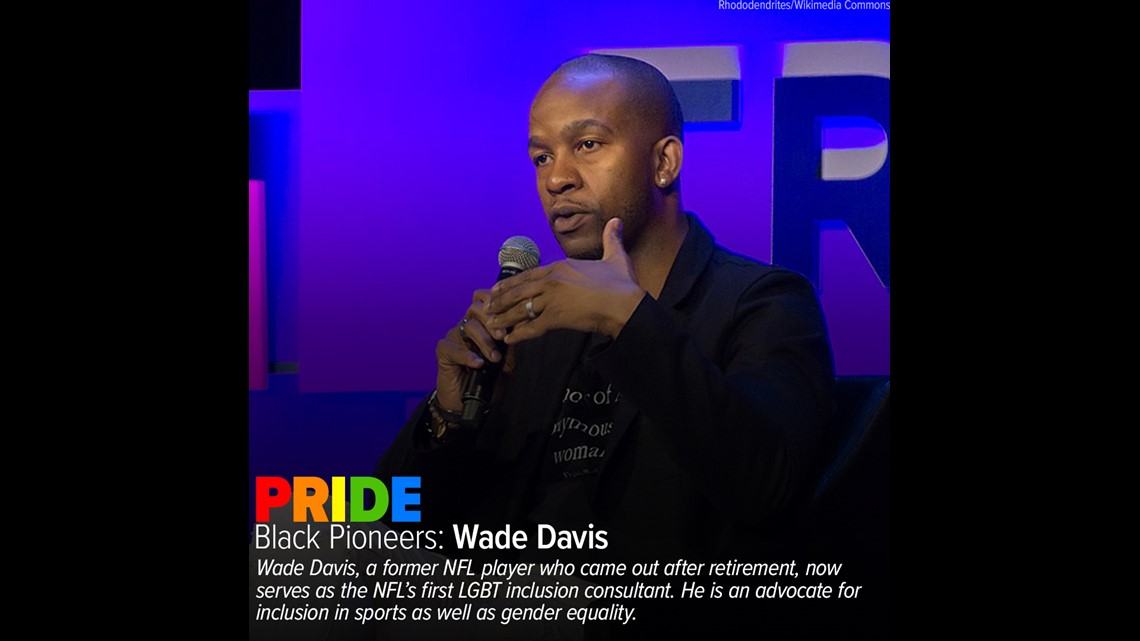
Davis, who spent four preseasons in the NFL and also played in the NFL Europe, came out as gay following his retirement. Since then, he’s been a prominent activist.
In a 2012 interview with Out Sports, Davis Davis said he was afraid to come out as an active player.
“You just want to be one of the guys, and you don’t want to lose that sense of family,” he said. “Your biggest fear is that you’ll lose that camaraderie and family.”
In the years since his football career, he has set out to champion equality and inclusion.
In fact, he is now the NFL’s first LGBT inclusion consultant on issues at the intersection of sexism, racism and homophobia, according to his bio.
His work goes beyond the sports realm, too.
He also consults for big-name companies like Google and Netflix. As the #MeToo movement gained traction, he used his voice to help men understand what actions are needed toward gender equality. In this work, he built a “Men’s Gender Equality Development” leadership program that he launched with the United Nations.
Davis’ work on an international stage does not end with the United Nations. He also served as a surrogate to President Barrack Obama.
Through all of his work, though, he hasn’t forgotten his roots. In 2012, he was named the Executive Director of the You Can Play Project, an organization dedicated to ending discrimination, sexism, and homophobia in sports. He still serves You Can Play today.
As for advice, he told HuffPost in 2018 he has to pieces to offer other athletes who are currently closeted: Develop a practice of self-love and find people who you can be yourself with.
- Florida suspends drinking at all bars statewide as COVID-19 continue to spike
- US must free migrant children from family detention centers, judge rules
- Coronavirus concerns close Miami-Dade beaches for 4th of July weekend
- Trump signs executive order to protect statues. monuments and memorials
- Florida adds another 8,942 new COVID-19 cases, the highest single-day spike yet
- A look inside the two zip codes with the highest COVID-19 numbers in Pinellas County
►Stay In the Know! Sign up now for the Brightside Blend Newsletter

